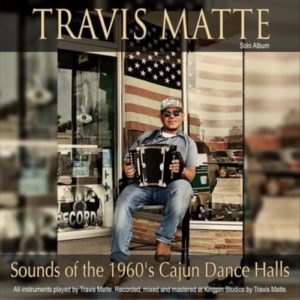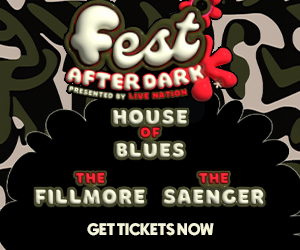The 1960s had to be an exciting time for Cajun music. Even though it hadn’t reached hipster status yet, its dancehalls were thriving, a scene held together by dedicated musicians keeping their precious cultural commodity from succumbing to the destructive onslaught of Americanization.Travis Matte
Despite being born in 1973, it’s the era multi-instrumentalist Travis Matte was influenced by growing up in a musical family. Though eventually Matte branched off to do zydeco and other genres with his popular Kingpins, he never abandoned his deep, rich bloodlines.
For years, Matte has yearned to do his dream album: what would it be like if his idols shared the same stage? In other words, pay homage to those keeping Cajun music alive during that time. And not just any tribute, but one that sounded like it was recorded back then, using the same analog vacuum tube equipment. Matte says it took 20 years of horse trading of equipment to get the sound he desired, finally ending up with a rebuilt ’50s Collins 212 Console and a ’58 Pultec Equalizer, initially bought by Crowley record man JD Miller and used by his son Mark until he sold it to Matte a few years ago. Matte tried the digital route and got close but discovered that by driving the old, hot tubes, the tone of the accordion sounded rawer and more vintage. “Lafayette Two Step,” the opening track, was when Matte finally had the sound he wanted. However, it would still take nearly two years to complete the project due to balancing other demands.
Amazingly, Matte recorded himself playing every instrument masterfully: accordion, fiddle, steel guitar, electric guitar, bass and drums. At some point during his career, he played all these at a gig mentored by one of his idols. Interestingly, Matte’s steel guitar is a custom nine-string once owned by Conway Twitty steel guitarist Lew Houston.
Overall, Matte managed to squeeze 18 songs into an efficient 52 minutes to capture an authentic retro dancehall sound. Accordion, fiddle, steel, and electric guitar rides follow each other in whiz-bang quick succession as if they were played by a top-notch band, with each musician in full command of his instrument. Matte played many selections in the style of one of his idols. For the beautiful “Reno Waltz,” a Lawrence Walker signature song, Matte played fiddle in the style of Grandfather Ernest Bearb. On “Johnny Can’t Dance,” Matte played accordion a la Great-grandfather Pierre.
Not only did Matte play tunes in the style of one of his idols, but on some selections, he also played their fiddles on the tune they had recorded. On the stately “Mulberry Waltz,” Matte played the same fiddles Tony Thibodeaux, Doc Guidry and Louis Foreman played when they recorded it with Aldus Roger in the late ’60s. On the ferociously peppy “Perrodin Two Step,” Matte played accordion and guitar solos before kicking in with a spectacular fiddle ride via Thibodeaux’s fiddle. It’s one of the few tracks where Matte’s breathtaking tone can be genuinely appreciated.
Instrumentals “Lake Arthur Stomp” and “Scott Playboys Special” are not only high-energy and rousing but smash it to smithereens. Matte took the one-chord vamp “Turner Breakdown,” played weekly by accordionist Donald “The Human Jack” Himel on Thursday nights on KBON, and added a few turns and whipping drums, burning steel guitar and twin fiddles for a full band arrangement.
Of the others Matte wrote or co-wrote, “Out on the Town” is in the spirit of when Cajun fiddlers occasionally sang in English so the accordionist could have a break. On this infectious, sans accordion dandy, Matte gets it hoppin’ with Western Swing style fiddles and fat, double notes on the guitar to sound like twin guitars. The waltzing “The Widow and Her Daughter,” co-written by KBON radio personality Todd Ortego, Matte and Johnnie Allan, is about a guy who enjoys visiting a widow and her daughter. In the end, he marries one of them, but the mystery is the song doesn’t reveal whom.
As much as this is a salute to the heyday of Cajun dancehalls and the greats who stomped their stages, it’s also a testimony to Matte. He was weaned on these sounds and spent years learning and mastering the instruments, particularly the fiddle, for which he won multiple awards. Later, he became a proficient sound engineer and producer, actively recording other bands today. Sounds of the 1960s Cajun Dance Halls is also his story.




